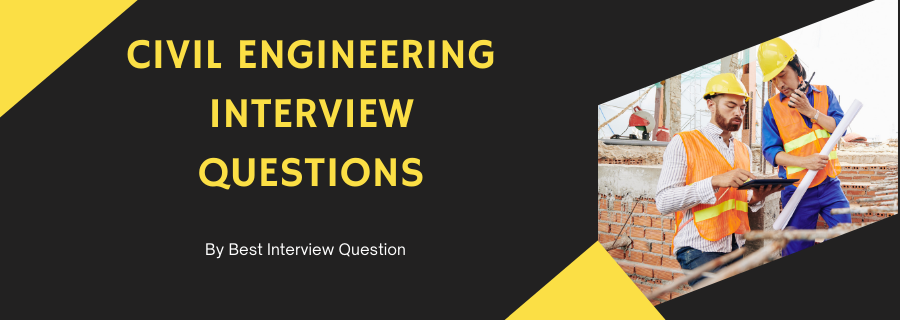Civil Engineering Interview Questions and Answers

Civil Engineering is a branch of engineering which deals with building, long stories, their designing, constructions, and maintenance with the passing time. With the advancement in the number of job opportunities, there has been a rise in the number of Civil Engineering Interview Questions. It is a discipline which involves the construction of public works, namely sewerage systems, roads, canals, structural components of buildings.
Most Frequently Asked Civil Engineering Interview Questions
The measurement is done after the curing process has taken place for 7 days or 28 days. The load should be applied slowly at the rate of 140 kg/cm2 per minute until the Specimens fails. We get the compressive strength of the concrete or the cement at the load failure divided by the specimen’s area.
Bleeding, in civil engineering, is a process and state of mixing water in the concrete in which the concrete rises above the material’s surface.
- Planning of all the work to be done on the project
- Make the decisions as required
- Organization and preparation of the list of the work
- Consider safety and health regulations along with the other legislation
- Traveling between the sites for client meetings
- Shear slump
- True Slump
- Collapse slump
(One of the easiest civil engineering interview questions.)
- Fixed price or lump sum contracts- In this contract, the buyer agrees to pay a fixed amount and then the contractor agrees on that. There are no changes made in the amount and some allowances which gives the buyer some sort of certainty in it.
- Time and material contracts- Here time is the major factor which derives all the contract and decides the money. Material and time spent by the builder along with his subcontractors. It is not certain as time, and the cost of the materials keep on changing.
- Cost plus contracts- Actual construction cost is paid to the contractor along with a set percentage of an amount for constructing a building. There are several ways involved here such as the addition of cost with a fixed fee.
- Right-click the dimension on the drawing sheet.
- Select Edit from the menu.
- The dimension value is represented by <<>> in the Edit Dimension dialog box.
- Click on the Hide Dimension Value check box and enter the dimension of the string to be displayed.
- Close the dialog box by clicking OK.
- The text to be entered in the string now replaces the dimension value.
- Asphalt Shingles
- Laminated Asphalt Shingles
- Asphalt Roll Roofing
- Rubber Membrane Roofing
- Cedar Shingles or Shakes
- Living Roofs
- Solar Tiles
Read more Civil Engineering Interview Questions and crack the interview with ease.
e strength is 3.5 N/mm2 so, of the flyash brick woulIt is three times greater than the normal brick made with clay, i.e. the value of the normal clay brick’s compressivd be 10-12N/mm2.
The size of a standard room is considered to be 10*10 feet.
Development History
In the year 1819, Norwich University became the first college to teach Civil Engineering. Read Civil Engineering Interview Questions below. In the year 1835, Rensselaer Polytechnic Institute awarded the first civil engineering degree.
Advantages
- Being a civil engineer, you get several opportunities for meeting a lot of work, people and interact with people.
- Helps in gaining appropriate skills required for a better client dealing
- Civil Engineering gives a structure to perform all the activities to be done in an organized way.